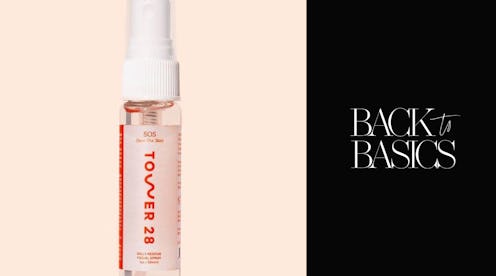(Beauty)
Everything You Need To Know About Hypochlorous Acid, A COVID-Fighting Skincare Staple

Just like CBD skincare routines changed the game for sensitive skin types, hypochlorous acid boasts a laundry list of skincare benefits — like fighting acne, soothing eczema, healing wounds, improving scarring, and more — while boasting near universal tolerability for virtually all skin types.
Beyond its skincare benefits, there is another reason we think that hypochlorous acid is the must-try skincare active of summer 2020, and it all boils down to COVID-19. The global pandemic has changed the way we live our lives, run our businesses, and tend to our daily, personal hygiene (hand sanitizer, anyone?). So when the EPA registered hypochlorous acid as a COVID-19 fighting disinfectant, taking additional steps to ensure the availability of hypochlorous acid to consumers, our interest was piqued. "It appears to be virucidal in concentrations above 50 ppm," Dr. Kelly Killeen MD, a Beverly Hills-based double board-certified plastic surgeon, tells TZR. Improving our skin while protecting against COVID-19... honestly — what could be better?
Naturally, we had to know more. Read what the experts say below.
What Is Hypochlorous Acid?
"Hypochlorous acid (HOCI) is produced internally as a naturally occurring compound by our white blood cells, and is an important part of our innate immune system," Ava Shamban, MD and founder of SkinFive and AvaMD Clinics and co-host of the GIST on YouTube, tells TZR. The acid is highly capable of combating pathogens and destroying infectious agents on the skin. "The antimicrobial activity is not that of a conventional antibiotic, but rather functions as an agent that is directly toxic to microbial cells," she continues, noting that, yes, it will even kill COVID that has landed on the skin. "It can take as little as one minute to do its magic [but] the general consensus for disinfecting is to leave it for ten minutes," Killeen explains. This fact also speaks to its ability to be lethal to pathogens while leaving the skin's protective microbiome of pre- and probiotics unharmed.
HOCl's innate origins within the immune system make it appropriate for virtually all skin types, particularly for sensitive skin types. Dr. Shamban points to other perks, too: Primarily, it's a highly stable as an active ingredient, which simplifies its method of delivery to the skin. "Product formulation is still important, however, because function depends upon the correct pH," she tells TZR.
Hypochlorous Acid (HOCl) in Skincare
Hypochlorous acid falls into the category of almost too good to be true, Dr. Shamban continues. "It is highly antimicrobial, antiviral, anti-fungal, and is a great anti-inflammatory with immunomodulatory effects." For starters, this means that hypochlorous acid prevents bacterial overgrowth while reducing inflammation, giving it a two-fold approach in the treatment of acne. As an anti-fungal, it can treat fungal acne that pops up when yeast overtakes the skin's microbiome of good bacteria. The immune-modulating effect accounts for its ability to treat chronic, inflammatory skin conditions like psoriasis, eczema, atopic dermatitis, and seborrheic dermatitis, which characterized by the body's immune system attacking the skin.
While hypochlorous acid has been incorporated into cleansers, serums, and face mists, it is also used in dermatological practices. For more invasive treatments, it can be applied both pre- and post-procedure, disinfecting and aiding with healing. "I've found that hypochorous acid has been a game-changer for both myself and my patients," Killeen states. "I use it in my practice for both prepping the skin for injectables, and to help heal incisions and small wounds. The anti-inflammatory properties are so helpful with post-op healing," she notes.
Hypochlorous Acid & COVID-19
As Killeen confirms, "It's important to note that the active ingredient is highly active against SARS CoV-2," referring to the novel coronavirus' scientific name. She notes others ways that hypochlorous acid can be used in the era of COVID-19, which range from sanitizing the surface of the skin, to treating mask-exacerbated acne (i.e. "maskne"). "Another area where I've found [HOCl face mist] to be helpful is the treatment and prevention of dermatitis caused by wearing masks," she adds, noting that she keeps a bottle of Tower28's SOS (Save. Our. Skin.) Daily Rescue Facial Spray on her desk at work for exactly this reason, as it features the acid. She also shares that HOCI mouthwashes are being used prior to mouth procedures to help minimize the risk of spreading COVID.
Face mists containing HOCl are perhaps the most convenient, portable option to disinfect the face — including the nose and mouth region, where the risk of transmission is considered highest. Mists can be easily and effectively applied whenever we have been exposed to crowds of people, and even super-spreader events. If you are traveling on an airplane, Kelly McCann MD, founder of Orange County-based The Spring Center, recommends bringing a bottle of hypochlorous acid face mist to apply every couple of hours in-flight. After grocery shopping, she notes that you can remove your mask and spritz your face once you have gotten back to your car. Those attending peaceful protests in solidarity with the Black Lives Matter movement should absolutely consider the benefits of HOCl face mists, too, to limit the risk of exposure.
If you are interested in incorporating hypochlorous acid into your skincare regimen, here are 10 options to shop below.
We only include products that have been independently selected by The Zoe Report’s editorial team. However, we may receive a portion of sales if you purchase a product through a link in this article.
If you think you’re showing symptoms of coronavirus, which include fever, shortness of breath, and cough, call your doctor before going to get tested. If you’re anxious about the virus’s spread in your community, visit the CDC for up-to-date information and resources, or seek out mental health support.